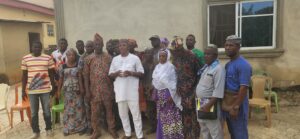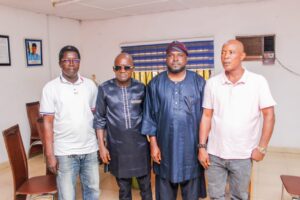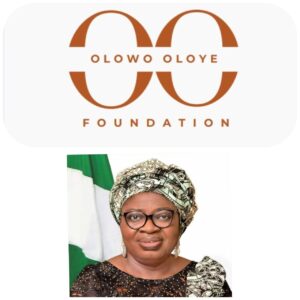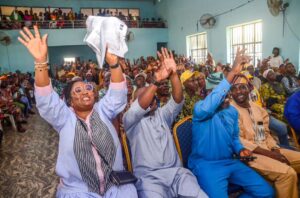President Tinubu’s Second-Year Anniversary Speech
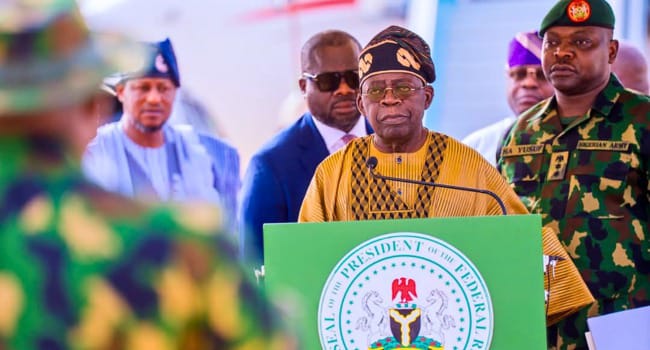
President Tinubu’s Second-Year Anniversary Speech
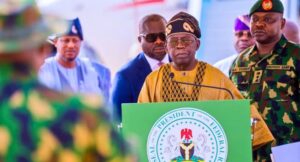
Fellow Nigerians,
As we commemorate the second anniversary of our administration, I extend my heartfelt appreciation for your resilience and unwavering spirit. Two years ago, you entrusted me with the sacred duty to lead our nation through a period marked by significant challenges. Together, we have faced these obstacles with courage and resolve.
The state of our economy and national affairs at inception demanded a bold new approach. Immediately, we introduced critical policies to prevent our country from further decline: ending decades-long fuel subsidies and reforming the multiple foreign exchange windows plagued by corruption. These measures were necessary, as the old systems had become unsustainable and were choking our future prospects.
Since then, our administration has undertaken reforms to revitalize the economy and strengthen our social fabric as a united nation. I thank all Nigerians for your steadfast support and belief in our shared vision to uplift Nigeria and restore hope.
Today, on May 29, 2025, we mark 24 months of progress—an opportunity to reflect on how far we have come in steering Nigeria toward socio-economic development.
From the outset, driven by hope and faith in Nigeria’s unity and potential, I pledged to confront our nation’s challenges head-on—rebuilding trust, fostering prosperity, and restoring economic health. I am proud to affirm that these reforms are bearing fruit. We are on a path toward a more stable, prosperous Nigeria.
Under our Renewed Hope Agenda, we committed to tackling economic instability, enhancing security, reducing corruption, reforming governance, and lifting our citizens out of poverty. While implementing these reforms, we have remained honest about the difficulties faced by families, recognizing that the only alternative to change would have been a fiscal crisis—leading to runaway inflation, debt default, fuel shortages, a depreciating Naira, and economic collapse.
Despite the rising cost of living, tangible progress is evident:
– Inflation is easing, with prices of staples like rice declining.
– The oil and gas sector is recovering; rig counts have surged over 400% since 2021, with over $8 billion in new investments committed.
– Our economy has stabilized, positioning us for growth and resilience against global shocks.
Fiscal targets remain on track: crude oil proceeds are aligned with forecasts, and our fiscal deficit has narrowed from 5.4% of GDP in 2023 to 3.0% in 2024, thanks to improved revenue collection and transparency. In the first quarter of this year, we generated over N6 trillion in revenue.
We have discontinued costly Ways & Means financing, and the NNPC, freed from unsustainable fuel subsidies, is now contributing positively to the Federation Account. Local refining efforts are also securing fuel supply.
Our debt profile is improving: while foreign exchange revaluation has increased our debt-to-GDP ratio to around 53%, debt service as a share of revenue has fallen from nearly 100% in 2022 to below 40% in 2024. We have paid off IMF obligations and grown our external reserves by nearly 500%, from $4 billion in 2023 to over $23 billion by late 2024.
Thanks to these reforms, state revenues increased by over N6 trillion in 2024, enabling subnational governments to reduce debt, pay salaries and pensions promptly, and invest in infrastructure and human capital.
A key achievement is our bold tax reform agenda, which has seen the tax-to-GDP ratio rise from 10% to over 13.5% in just one year. This was achieved through improved administration and policies that promote fairness, efficiency, and growth. We are removing multiple taxation burdens, easing the way for small businesses to formalize and expand, and protecting low-income households by zero-rating essential goods like food, education, and healthcare. VAT exemptions on rent, transportation, and renewable energy further reduce household costs.
We are ending opaque tax waivers, replacing them with targeted incentives for high-impact sectors such as manufacturing, technology, and agriculture—stimulating inclusive economic growth. Special focus is on empowering youth with digital-friendly tax policies, export incentives, and streamlined trade processes through the National Single Window project.
To ensure fairness and accountability, we are establishing a Tax Ombudsman—a new independent body to protect taxpayers and ensure transparency, especially for small businesses. Additionally, a new national fiscal policy framework will guide responsible taxation, borrowing, and spending, laying the groundwork for a sustainable future.
Our efforts to diversify the economy include revitalizing the solid minerals sector, which has seen increased revenue and investment, moving away from old policies to value-added approaches.
In healthcare, we are making significant strides: over 1,000 Primary Health Centres are being upgraded, six new cancer centres are being established, free dialysis services are being piloted, and maternal health initiatives have facilitated over 4,000 free cesarean sections. Health insurance coverage has expanded from 16 million to 20 million within two years.
Our economy is strengthening, with real GDP growth of 4.6% in Q4 2024 and an annual growth rate of 3.4%, the strongest in a decade.
Security remains a top priority. Our administration has enhanced collaboration among security agencies, increased intelligence-led operations, and prioritized the welfare of our armed forces. I commend our brave security personnel—whose sacrifices often go unrecognized—for their dedication. We have seen successes, especially in the northwest, where peace has been restored in areas previously controlled by bandits, allowing farmers to return to the land and safer travel on our roads. Efforts to rescue abducted citizens continue, and we remain committed to safeguarding every Nigerian’s right to live in peace.
Human capital development is central to our growth strategy. We are expanding access to quality education, upgrading health facilities, and deploying skilled personnel to underserved areas. Youth empowerment programs—including access to funds, skills training, and employment initiatives—are opening new opportunities. Our innovative agencies like NASENI are leading the way in industrialization, deploying digital tools, launching manufacturing projects, and creating jobs—embodying our government of action driven by youthful energy and innovation.
Agriculture remains vital. We have launched aggressive initiatives to boost local food production, support farmers with mechanized tools, and stabilize prices. Infrastructure development continues with major road projects across all regions, enhancing connectivity and economic activity.
In energy, we are upgrading power generation and transmission, investing in off-grid solar to power homes, industries, and institutions.
Looking ahead, Nigeria is preparing to host the Motherland Festival, a grand event celebrating our rich heritage, creative industries, and vibrant culture. This festival will showcase Nigeria to the world, boosting tourism and national pride. Recognizing the vital role of the Nigerian diaspora, we have introduced policies like diaspora bonds and non-resident banking measures to encourage investment and engagement from Nigerians abroad.
The Motherland Festival will serve as a unifying moment, reaffirming Nigeria’s leadership role on the continent and our commitment to global partnerships.
In closing, I acknowledge the sacrifices many Nigerians continue to make as we reposition our country for a brighter future. Our journey is ongoing, but our vision and resolve remain steadfast. With God’s grace, I am confident that the worst is behind us. The tangible impact of our efforts is emerging; the future is promising. Together, we will build a stronger, more inclusive Nigeria that we can all be proud of.
Thank you, and may God continue to bless Nigeria.

